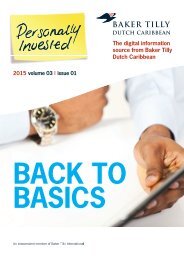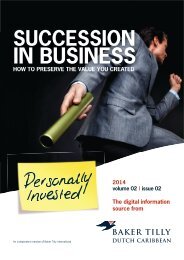Baker Tilly Dutch Caribbean | Edition 1 2014
The digital information source from Baker Tilly Dutch Caribbean.
The digital information source from Baker Tilly Dutch Caribbean.
Create successful ePaper yourself
Turn your PDF publications into a flip-book with our unique Google optimized e-Paper software.
VOLUNTARY<br />
DISCLOSURE<br />
What if a taxpayer forgot to<br />
report or incorrectly<br />
reported taxable income in<br />
their personal income or<br />
profit tax return(s)?<br />
Fortunately, the taxpayer may<br />
request a so-called voluntary<br />
disclosure (in <strong>Dutch</strong> “vrijwillige<br />
verbetering” or “fiscale inkeer”) and<br />
still submit the correct and complete<br />
information to the Tax Authorities at<br />
a later point in time.<br />
A voluntary disclosure is only<br />
possible as long as the taxpayer<br />
was not aware or reasonably could<br />
not have been aware that officials of<br />
the Tax Authorities were familiar with<br />
or about to become familiar with<br />
the incorrectness of the filed tax<br />
return. Hence, the rectification must<br />
take place on a voluntary basis and<br />
only before the tax authorities raise<br />
questions or announce a tax audit.<br />
The benefit of a voluntary disclosure<br />
for the taxpayer is that the taxpayer<br />
does not have to pay an offence<br />
fine (in <strong>Dutch</strong> “vergrijpboete”) of<br />
up to 100% but only a default fine<br />
(in <strong>Dutch</strong> “verzuimboete”) with a<br />
maximum of 15%. In Aruba there<br />
will also be no offence fine, but<br />
there is no maximum to the default<br />
fine that can be imposed. Arthur<br />
van Aalst: “Make sure that your<br />
tax lawyer arranges that there will<br />
be no prosecution on the basis of<br />
a criminal provision as a result of<br />
the voluntary disclosure. Pursuant<br />
to tax regulations, a voluntary<br />
disclosure avoids an offence fine or<br />
criminal tax penalties but it does not<br />
automatically avoid prosecution on<br />
the basis of criminal provisions”.<br />
TIO / FIOD<br />
INVESTIGATION?<br />
Have your tax attorney at your side!<br />
Most taxpayers only deal<br />
with Tax Inspectors or<br />
the BAB.<br />
In case these officials of the Tax<br />
Authorities suspect that a taxpayer<br />
deliberately or regularly evades tax<br />
laws, they may contact an officer<br />
of a tax investigation bureau. For<br />
Curaçao and St. Maarten this is<br />
the TIO (“Team Inlichtingen en<br />
Opsporing”) and for the BES Islands<br />
it is the FIOD (“Fiscale Inlichtingen<br />
en Opsporingsdienst”). These tax<br />
investigation bureaus will come into<br />
action if a taxpayer is suspected of<br />
a criminal tax offense. Arthur van<br />
Aalst: “If an investigation officer<br />
informs a taxpayer that he is<br />
considered a suspect, don’t make<br />
any further statements and contact<br />
your tax attorney immediately.” The<br />
investigative methods and tools<br />
used by the TIO or FIOD are totally<br />
different from investigations by the<br />
Tax Authorities (e.g. the BAB),<br />
as are the rights of a taxpayer and<br />
the penalization. For instance,<br />
a Government Tax Inspector is not<br />
permitted to make use of invasive<br />
methods such as wiretaps,<br />
house searches or observations<br />
of suspects.<br />
And where the taxpayer generally<br />
makes use of a tax advisor, he now<br />
needs a tax attorney to represent<br />
him during the hearings by the<br />
TIO or FIOD officials or during the<br />
sessions before a criminal Court.<br />
pag 16 pag 17






